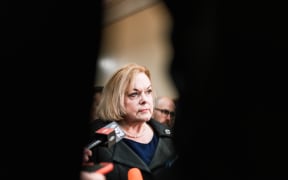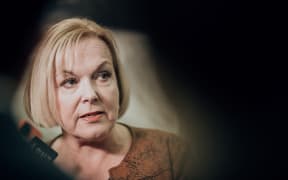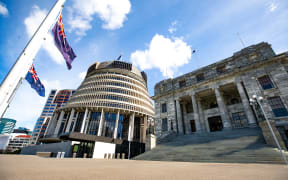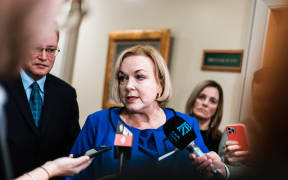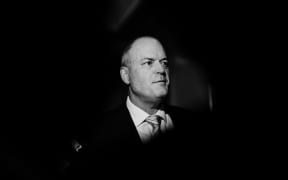Former National leader Simon Bridges says his time in charge was "damned and doomed" due to the "circling wolves", "bedwetters", and MPs who thought themselves bigger than the party.

Photo: RNZ / Samuel Rillstone
The searing observations feature in the Tauranga MP's book National Identity: Confessions of an Outsider, to be published tomorrow. The book, which is billed as "not a political memoir", has few sensational revelations but does recount the events leading up to Bridges' brutal toppling.
In one chapter, Bridges - who took over as leader from Bill English in early 2018 - reveals the immense personal pressure he felt to keep the party vote up.
"I always lived knowing that, were there a bad TV poll, the small camps in caucus around [eventual successors] Todd Muller and Judith Collins would become larger."
He argued he was able to keep the party's popularity above 40 percent in part by "pushing hard issues online" through a series of "all guns-blazing" social media campaigns.
The hard-nosed strategy appeared to buoy the party vote, but spurred vitriol from sectors of the public and put Bridges offside with his colleagues.
"Some in the team were squeamish. They wanted 'Kumbaya' with the government (and still do)," Bridges wrote.
Certain MPs flatly refused to promote certain policies, telling Bridges they "just weren't on brand for them personally".
"As leader, I would end up doing the team's dirty work," Bridges wrote.
"If I hadn't, our party vote would always fall, and a spill would be on from the two or three in caucus who were always limbering up for a challenge.
"My leadership was damned and doomed either way."
Ironically, it was a social media post which could be considered "the beginning of the end" of Bridges' time at the top.
A Facebook post - critical of the government for extending lockdown - unleashed an avalanche of public fury at Bridges, and revived speculation of a coup.
Bridges accepted he misjudged the public mood, but also floated his suspicion there may have been "foul play" behind the overwhelmingly negative response.
"Shortly after that Facebook post, the circling wolves got the chance they'd long been waiting for and a spill was on," Bridges wrote.
"As quick as that, I was no longer leader. The bedwetters won".
Bridges was sparing in his disparagement of those who toppled him, though he named long-serving MP Gerry Brownlee as one of his betrayers.
"For such a senior guy, Gerry liked hares and hounds and, in my view, he sought to run with both, voting against me."
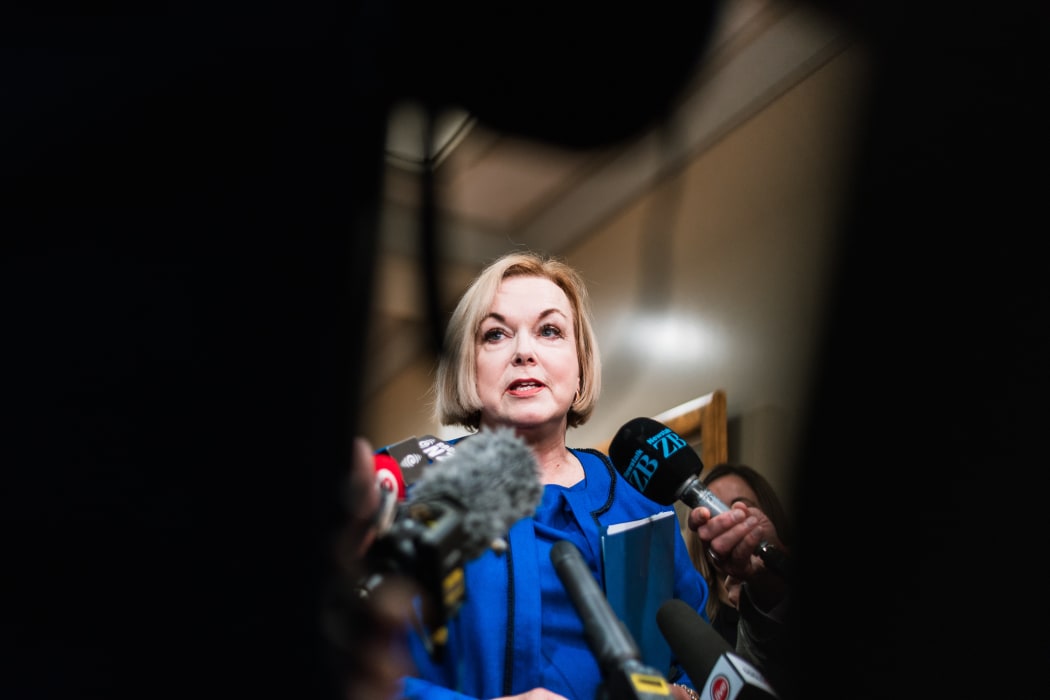
Bridges says he has no doubt the party would have done better at the election if he was still leader. Photo: RNZ / Samuel Rillstone
In a separate chapter, Bridges made an oblique criticism of others in his caucus, bemoaning MPs with limited life experience outside of Parliament.
Such MPs tended to have a "cynical and sterile" view of politics, treating it as a game: all gossip, briefing and leaking, he said.
"For the new technocrats there isn't much difference between the political parties," Bridges wrote.
"For them, it's often good enough to fight over who can execute the same stuff best - leaving competence and ability to implement as the only things separating Labour and National."
In May 2020, National MP Todd Muller successfully challenged for the leadership, but lasted just 53 days in the job before resigning. He later revealed he had become overwhelmed by anxiety and was unable to cope with the stress of the job.
"Sadly, as we saw, if leaders today don't do their own pushing for votes, then others don't either and as the party numbers fall, almost inevitably, chaos and pandemonium ensues," Bridges wrote.
Current leader Judith Collins was quickly elevated by the caucus following Muller's abrupt resignation. She led the party to a crushing electoral defeat, receiving just 25.6 percent support.
Bridges noted: "I don't think there is any doubt that continuity of my leadership would have resulted in a better election result for National."
Since then, Collins has faced constant questions about her position, unable to lift the party above 30 percent in the polls. Former Air New Zealand chief executive Christopher Luxon is often touted as a potential successor, though he has repeatedly denied any such intentions.
Bridges has also ruled out taking another tilt at the job.
In his book, he admitted he preferred "reading history to watching rugby" and joked many would consider that "an automatic disqualification from leading our country".
"I can see [former Prime Minister] John Key shaking his head in disbelief, now more sure than ever why he backs Chris Luxon and Nicola Willis."

